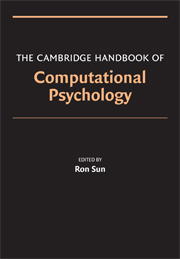Book contents
- The Cambridge Handbook of Computational Psychology
- The Cambridge Handbook of Computational Psychology
- Copyright page
- Contents
- Preface
- List of Contributors
- Part I Introduction
- Part II Cognitive Modeling Paradigms
- 2 Connectionist Models of Cognition
- 3 Bayesian Models of Cognition
- 4 Dynamical Systems Approaches to Cognition
- 5 Declarative/Logic-Based Cognitive Modeling
- 6 Constraints in Cognitive Architectures
- Part III Computational Modeling of Various Cognitive Functionalities and Domains
- Part IV Concluding Remarks
- Author Index
- Subject Index
2 - Connectionist Models of Cognition
from Part II - Cognitive Modeling Paradigms
Published online by Cambridge University Press: 05 June 2012
- The Cambridge Handbook of Computational Psychology
- The Cambridge Handbook of Computational Psychology
- Copyright page
- Contents
- Preface
- List of Contributors
- Part I Introduction
- Part II Cognitive Modeling Paradigms
- 2 Connectionist Models of Cognition
- 3 Bayesian Models of Cognition
- 4 Dynamical Systems Approaches to Cognition
- 5 Declarative/Logic-Based Cognitive Modeling
- 6 Constraints in Cognitive Architectures
- Part III Computational Modeling of Various Cognitive Functionalities and Domains
- Part IV Concluding Remarks
- Author Index
- Subject Index
Summary
Information
- Type
- Chapter
- Information
- The Cambridge Handbook of Computational Psychology , pp. 23 - 58Publisher: Cambridge University PressPrint publication year: 2008
Accessibility standard: Unknown
Why this information is here
This section outlines the accessibility features of this content - including support for screen readers, full keyboard navigation and high-contrast display options. This may not be relevant for you.Accessibility Information
- 41
- Cited by
